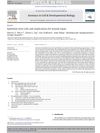FOXO1, TGF-β Regulation and Wound Healing
September 2014
in “
International Journal of Molecular Sciences
”

TLDR FOXO1 is important for wound healing, but its dysfunction in diabetes can slow the healing process.
The 2014 review discusses the transcription factor FOXO1 and its significant role in wound healing. FOXO1 is essential for reducing oxidative damage, increasing TGF-β1 expression, and promoting keratinocyte migration and proliferation, which are all critical for successful wound repair. Lack of FOXO1 leads to increased oxidative damage, reduced TGF-β1 expression, and impaired re-epithelialization due to decreased keratinocyte migration and increased apoptosis. The review also addresses the altered function of FOXO1 in diabetic conditions, which results in impaired wound healing due to increased apoptosis and inflammation. High glucose levels further impair FOXO1's ability to stimulate TGF-β1, exacerbating poor healing outcomes. The document suggests that while FOXO1 is crucial for normal wound healing, its dysregulation in diabetes can hinder the healing process, making it a potential therapeutic target for improving wound repair in diabetic patients.



